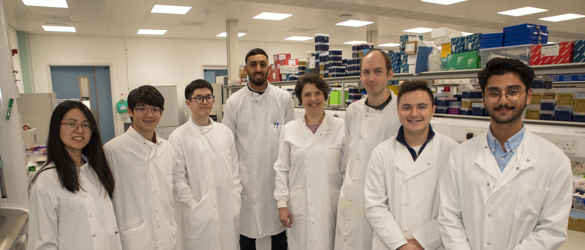Investigating early onset macular degeneration

Professor Graeme Black, University of Manchester - £164,042
April 2018 – September 2021
Creating eye cell models from patients with early onset macular degeneration to better understand causes and possible treatments for both early onset macular degeneration (EOMD) and age-related macular degeneration (AMD).
What’s the problem?
EOMD progresses similarly to AMD, although it tends to affect people at a younger age. EOMD is known to run in families and is often caused by a mutation in a gene called CFH. However, much less is known about EOMD and possible treatments compared to AMD.
What did this project achieve?
This project aimed to better understand the genetic cause of EOMD and how the genetic mutations lead to disease. Through this work, the researchers highlighted the role of FHL-1, a protein produced from the CFH gene, in retinal health and disease. This discovery may help lead to improvements in genetic testing and treatment of EOMD.
They have grown stem cells with faulty FHL-1 proteins as a model of EOMD to better understand the changes that occur in retinal cells due to the condition. Finally, the researchers created a genetic test to help find genetic mutations associated with EOMD to give patients the correct diagnosis.
What’s next?
Following this project highlighting the importance of FHL-1 in EOMD, the researchers are looking now to explore whether certain genetic mutations involved in EOMD may respond to different drugs. Further research into the stem cells model of FHL-1 may also help uncover more insights into how EOMD and macular disease develops.
Publications
Taylor RL, Poulter JA, Downes SM, McKibbin M, Khan KN, Inglehearn CF, Webster AR, Hardcastle AJ, Michaelides M, Bishop PN, Clark SJ. Loss-of-function mutations in the CFH gene affecting alternatively encoded factor H-like 1 protein cause dominant early-onset macular drusen. Ophthalmology. 2019 Oct 1;126(10):1410-21.
Tanner A, Chan HW, Pulido JS, Arno G, Ba-Abbad R, Jurkute N, Robson AG, Egan CA, Knight H, Calcagni A, Taylor RL. Clinical and genetic findings in CTNNA1-associated macular pattern dystrophy. Ophthalmology. 2021 Jun 1;128(6):952-5.
See our other projects
Since 1987 the Macular Society has invested around £10 million in over 100 research projects.
Explore more research
Beating macular disease through funding medical research and improving the lives of those living with macular disease.
Get the latest research news from the Macular Society
To hear about life-changing research and treatments, subscribe to our monthly enewsletter today. Together we can Beat Macular Disease.
Sign up to our free email newsletter



